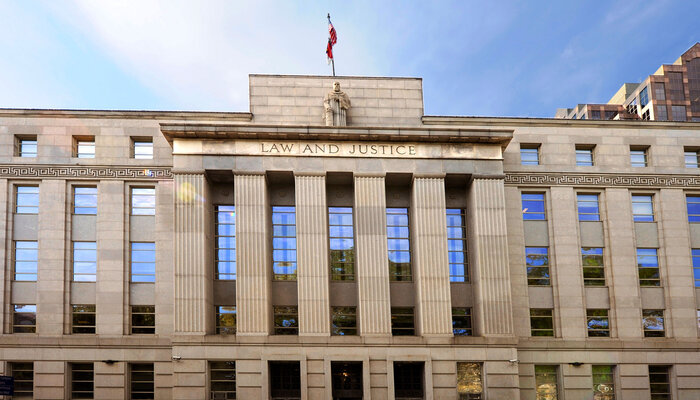Like many state court systems in our country, the North Carolina judicial system has a deficit of racial diversity. Among the high court’s seven jurists, Justice Anita Earls is its only Black justice. The state’s pool of oral appellate attorneys and state supreme court judicial law clerks is similarly racially homogenous: white lawyers comprised over 90 percent of all oral advocates before the court in 2021 and 2022, and there has been only one law clerk of color during each of the last two terms.
Yet when Earls spoke about these and other inequities in North Carolina’s justice system in a May news interview, her comments drew an investigation from the North Carolina Judicial Standards Commission. Now she has filed a federal lawsuit to defend her First Amendment right to speak publicly on such important issues.
In the Law360 interview, Earls discussed the lack of racial diversity among law clerks in North Carolina as well as a pattern of justices interrupting female attorneys. She also drew from her personal experience as a justice to describe interruptions from her own colleagues during oral arguments. And she criticized a policy choice by the court’s chief justice, Paul Newby, to terminate efforts aimed at ameliorating bias and racial discrimination in North Carolina’s courts. The interview was prompted by a study on the diversity of attorneys who argue before the state high court, written by North Carolina’s first Asian Solicitor General, Ryan Park.
In August, the commission notified Earls that it had reopened an investigation into her based on these comments following an anonymous complaint. (A few weeks earlier, the commission had dismissed a complaint alleging that Earls improperly divulged information to the public concerning court rules and procedure; members of the court and others had publicly discussed the same information.) According to the commission, Earls’s statements, if true, potentially violated Canon 2A of North Carolina’s Code of Judicial Conduct, which requires judges to conduct themselves “in a manner that promotes public confidence in the integrity and impartiality of the judiciary.”
The commission reviews complaints of ethical violations and judicial misconduct and is authorized to recommend discipline ranging from a public reprimand to removal from office. (The state supreme court decides whether to act upon the commission’s recommendation to impose punishment). While public information about the commission’s practices is limited, it appears that its investigation of Earls is highly atypical. Despite a statement by the commission to the press that state law requires it to investigate all complaints, in practice it exercises considerable discretion when carrying out its duties. For example, between 2018 and 2022, the commission received more than 2,400 complaints, but only 85 led to formal investigations.
In September, Earls asked a federal court to halt the commission’s investigation, arguing that her comments bringing to light “imperfections and unfairness” in the judicial system are core political speech robustly protected by the First Amendment.
The issues Earls raised in her interview are critical for the integrity and impartiality of our justice system. Research has found that diverse benches foster greater trust in the legal system, enrich deliberations among judges, and improve the quality of jurisprudence emanating from our courts. Studies have also shown that judges, like all people, are susceptible to implicit bias, and such bias can infect their judicial decision-making.
In view of these findings, in recent years judicial leadership and key legal stakeholders, including the National Center for State Courts and the American Bar Association, have urged judges to do more to combat racial discrimination in the system and implicit bias in the courtroom and to affirmatively promote diversity on the bench. Because judges are uniquely positioned to witness when the justice system is falling short on these fronts, it is wholly consistent with judges’ ethical duties to “promote public confidence in the integrity and impartiality of the judiciary” by speaking out honestly and publicly about the persistence of racism in American institutions.
The abuse of ethics complaints to target judges like Earls who speak out about diversity, implicit bias, and racial injustice in the legal system is a dangerous development at a moment when state judges are increasingly hearing high-profile and politically salient cases. Earlier this year Justice Jill Karofsky of the Wisconsin Supreme Cout revealed that she too was the subject of a frivolous ethics complaint — which was held open by the Wisconsin Judicial Commission for 16 months before ultimately being dismissed — in connection with statements she made during an oral argument in a challenge by former President Trump to the results of the 2020 election. Among other things, the complaint alleged that Karofsky violated ethics rules because she said that the decision to single out only two Wisconsin counties, both with large Black populations, “smacks of racism.”
Judicial standards commissions themselves have also become political targets, with numerous bills introduced in recent years seeking to assert more political control over the bodies tasked with judicial discipline. For example, this year Montana lawmakers passed a bill that gave the legislature and attorney general more appointments to the state’s disciplinary commission. North Carolina is also considering legislation that would give the legislature more appointments to its judicial standards commission.
At their core, these attacks appear less about genuine judicial ethics concerns than an effort to effectively nullify the elections in which justices like Earls reached the bench. Nor is this abuse of process and targeting limited to judges. Last May, the Tennessee legislature expelled two Black legislators for advocating on behalf of their constituents for gun reform. This month, Florida Gov. Ron DeSantis suspended the state’s only Black female state attorney because he disagreed with her charging decisions. As these developments indicate, harassing, threatening, and intimidating elected officials — often of people of color — is becoming more frequent and egregious.
Judicial ethics boards are an essential guardrail against judicial misconduct when functioning independently and properly. But they should not be used as political weapons to target judges for executing their duties or to silence them. At a time of plummeting confidence in our courts and persistent racial disparities in the justice system, judges like Anita Earls should be celebrated, not chastened.
Robyn Sanders served as a law clerk to Earls during the 2021–22 term.







